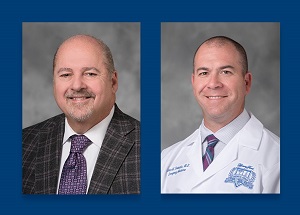Senior Leaders Deliver Ominous Message Ahead of the Holidays

DETROIT (December 21, 2021) – Senior leaders at Henry Ford Health System delivered an ominous message Tuesday that access to safe, high quality healthcare could be at risk if the rapid spread of COVID infections and hospitalizations continue unabated across Michigan.
Bob Riney, President of Healthcare Operations and Chief Operating Officer, and John Deledda, M.D., Chair of the Department of Emergency Medicine, said the health system is bracing for a spike in cases after the holidays and as Omicron takes hold as the dominant COVID strain in the United States.
Both urged people to get vaccinated, get their booster if eligible, wear a mask in indoor public settings, wash their hands often and avoid large gatherings. Currently, 57% of people in Michigan are fully vaccinated with either two doses of the Pfizer or Moderna vaccines or one dose of the Johnson and Johnson vaccine.
“Our hospitals are teetering, and our staffs are past the point of exhaustion but soldiering on like the heroes they are and what you would expect and hope for,” Riney said during a briefing with reporters. “We cannot allow our hospitals to become more overwhelmed or have more crossover infections with our workforce, because that could truly lead to a public health crisis.”
Officials said hospitalizations had eased in the last couple days to just under 400 (down from 440 the day before), bringing some relief to an already taxed workforce. But that was overshadowed by the 113 team members who tested positive for COVID in the last seven days and another 100 who tested positive on Tuesday – all from community spread. Riney said sidelined team members would only add to the ongoing staffing challenges.
“This is a concern and something we all have to be worried about,” he said. “This is an issue in every hospital in Michigan and throughout the country.”
Dr. Deledda said the “onslaught of preventable infections, the severity of illness of those infections and subsequent hospital admissions” have put the healthcare infrastructure at a tipping point.
“The surge volume we’re seeing in our Emergency Departments is resulting in an operating condition that is unsustainable,” he said. “For our Emergency Departments, and Emergency Departments in general, this has been the worst stage of the pandemic to date, and our situation is urgent.”
Dr. Deledda said lax attitudes around vaccination, masking and avoiding large gatherings have led to more COVID hospitalizations in Michigan than during the first surge in spring 2020.
“The burden of preventable illness and death for the past two years has placed an intense emotional and cognitive load on our staff,” he said. “The strongest among us are broken – physically, emotionally and mentally.”
Emergency Departments across the health system are operating at or above capacity and holding patients that require hospital admission until inpatient beds become available. At Henry Ford Hospital, certain elective, non-time sensitive procedures are being postponed, some operating rooms have been temporarily idled and certain critically ill patient transfers from around the state are not being accepted at this time because of unavailable beds in the intensive care units.
Fifteen years ago, Henry Ford Hospital’s Emergency Department was expanded to 78 beds to accommodate about 60,000 patient visits a year. In the last five years, the Emergency Department has been treating 100,000 patients a year in that same space. The pandemic and its complexities have only intensified the challenges in the Emergency Department, Dr. Deledda said.
Dr. Deledda emphasized that people not to delay going to the Emergency Department for life-threatening conditions like chest pain and stroke symptoms. People with non-urgent and routine medical conditions are advised to see their family doctor, schedule a video visit or go to an urgent care. Currently, the Emergency Department treats on average about 250 patients a day.
“To be very clear, our behaviors, our actions and our decision making within our communities around the prevention and spread of COVID-19, whether you are a citizen, whether you are a leader, or happen to be both, are directly impacting the short-term viability of hospitals,” Dr. Deledda said. “This, in turn, is impacting the ability of our Emergency Departments across the region to be responsive to the needs of our communities when they need it the most.
“We’re at an impasse with this pandemic and it’s not just going to go away,” he continued. “We’ve got an effective tool to stop the virus, to stop the increasing burden of illness and to stop the preventable death that is happening in our communities. That is getting vaccinated.”
###
NEWS MEDIA ONLY may contact David Olejarz / David.Olejarz@hfhs.org / 313-303-0606
.svg?iar=0&hash=F6049510E33E4E6D8196C26CCC0A64A4)

/hfh-logo-main--white.svg?iar=0&hash=ED491CBFADFB7670FAE94559C98D7798)









